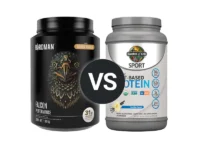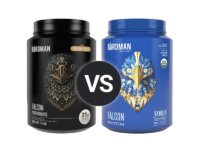Knowledge BaseYou're Questions Answered
Is pea protein powder safe during pregnancy?
Pea protein powder is a plant-based protein supplement made from yellow split peas. It is known for being hypoallergenic, vegan-friendly, and a good source of essential amino acids. For pregnant individuals, ensuring sufficient protein intake is crucial for the growth and development of the baby. Understanding whether pea protein powder is safe during pregnancy and how it fits into a balanced diet can help expectant mothers make informed dietary choices.
Nutritional Benefits of Pea Protein During Pregnancy
Pea protein powder provides several benefits that make it a good option for pregnant individuals:
- High-Quality Protein: Pea protein contains all nine essential amino acids, making it a complete protein when combined with other sources1. Protein is essential during pregnancy for the growth of fetal tissue, including the brain, and to support the mother’s increased blood supply and muscle development.
- Hypoallergenic: Pea protein is free from common allergens such as dairy, soy, and gluten, making it a safer option for those with food sensitivities2.
- Low in Additives: High-quality pea protein powders are often free of artificial sweeteners, flavors, and fillers, which can be beneficial during pregnancy when certain additives should be limited.
Considerations for Using Pea Protein During Pregnancy
1. Consult with a Healthcare Provider
Before incorporating any supplement into your diet during pregnancy, including pea protein powder, it is essential to consult with a healthcare provider. They can help determine your specific protein needs and ensure that your diet meets your nutritional requirements3.
2. Check the Ingredients
Ensure that the pea protein powder you choose is free from artificial sweeteners, added sugars, and other additives that may not be recommended during pregnancy. Look for products with simple, clean ingredient lists.
How to Incorporate Pea Protein into Your Diet
Pea protein powder can be a convenient way to meet protein needs during pregnancy, especially if you are experiencing food aversions or nausea. Here are a few ways to use it:
- Protein Shakes: Blend pea protein powder with fruits, leafy greens, and a milk of your choice for a nutrient-dense shake.
- Oatmeal or Porridge: Stir a scoop of pea protein powder into oatmeal for added protein.
- Baking: Add pea protein to baked goods such as muffins or pancakes to increase their protein content.
- Phillips, S. M., & Van Loon, L. J. C. (2011). Dietary protein for athletes: From requirements to optimum adaptation. Journal of Sports Sciences, 29(sup1), S29-S38.
- Vanga, S. K., & Raghavan, V. (2018). How well do plant and animal protein sources support muscle protein synthesis? International Journal of Environmental Research and Public Health, 15(8), 1703.
- Academy of Nutrition and Dietetics. (2019). Position of the Academy of Nutrition and Dietetics: Nutrition and lifestyle for a healthy pregnancy outcome. Journal of the Academy of Nutrition and Dietetics, 119(10), 1676-1692.
Related Questions
Related Reviews

Your Answer
We are a participant in the Amazon Services LLC Associates Program, an affiliate advertising program designed to provide a means for us to earn fees by linking to Amazon.com and affiliated sites.



